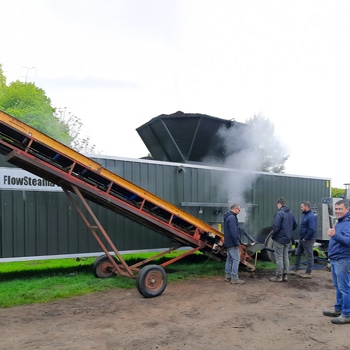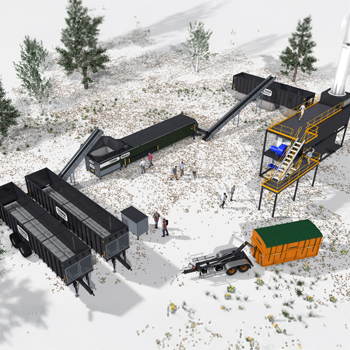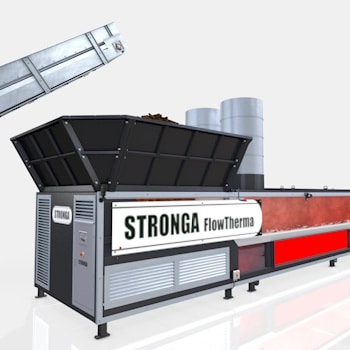The FlowSteama substrate pasteurisation system continues to provide long-term benefits for our clients in respect to energy, cost and substrate saving. We have devised a ‘Stronga FAQ article’ which answers some of the key questions that our customers often ask us regarding substrate and energy usage. If you have other queries that haven’t been addressed below, please feel free to get in touch with out specialist team today for further guidance – info@stronga.co.uk

Why Use Steam for Pasteurizing Growing Blends, Substrates, Biogas Digestate Fibres, Manures & Soil?
Steam sterilisation has been extremely well-proven over many decades with usage in horticultural applications dating all the way back to 1888. Research conducted by Stronga has shown how steam reliably removes almost all harmful pathogens when conducted in the right conditions for the appropriate duration.
Steam is also pure, organic and clean, avoiding the negative effects associated with chemical pest control which is toxic to both humans and the environment. These chemicals can also leave hazardous residues on sprayed surfaces, which can affect crop quality and flavour. Steam has high heat content, maintaining 50X more heat energy per Kg than a Kg of water – it has a much higher heat capacity but requires no more added pressure.

Steam is a gas which flows in accordance with pressure. This means the FlowSteama can operate without any pumps and is not subject to their construction inspections and maintenance costs. It releases heat energy uniformly throughout the FlowSteama vessel, comprehensively sanitising the entire substrate load. Steam is also the quickest and most efficient method of heat transfer – approximately 3X faster than alternative sterilisation methods. This makes FlowSteama the fastest pasteurisation system available in the market, allowing clients to reuse their pathogen-free substrate for the next growing cycle, almost immediately after heat-treatment.
Timings and temperatures are dependent on the properties of the client’s growing substrate to be heat-treated – contact Stronga to discuss your project.

Why Does Stronga Use “Low-Pressure” Steam?
Stronga use low-pressure, superheated steam to sanitise growing substrates in the FlowSteama vessel. The super-heated temperature of the steam makes it highly effective and efficient, sterilising most growing substrates in as little as 30 minutes. A key benefit of Stronga’s low-pressure steam equipment is that there are fewer regulations and restrictions for operators to worry about because the technology is relatively risk-free and extremely well-proven. This makes choosing Stronga for your heat-treatment needs far less costly or troublesome than using alternative high-pressure steam systems.

Why Does Stronga Use “Super-Heated” Steam?
FlowSteama is able to operate effectively at a low-pressure because it uses super high temperature, 200’C steam to eradicate pathogens in spent growing media. “Super-heated” steam refers to the increase in temperature from 100’C to 200’C in Stronga’s SteamBoila equipment. Our research has shown that this requires a mere 11% more energy but the overall effect on the overall pasteurization of the growing substrate is enormously beneficial. Almost immediately after steam heat-treatment, substrates are available for use in the next cycle of crop production and planting.
In order the maintain the excellent thermal-efficiency properties of the super-heated steam system, the FlowSteama vessel is tightly sealed and fully insulated to ensure no steam energy is lost in the transfer of heat energy from the boiler – into the soil and substrate.

What Are the Main Benefits of In-Vessel Heat Treatment?
The section below details some of the key benefits associated with in-vessel heat treatment of soils, substrates, manures and composts:
1. A fully insulated, contained-vessel system, FlowSteama ensures super-heated steam energy is never wasted or ‘lost’ to the atmosphere during the heat-treatment process.
2. FlowSteama’s unique ‘PulseWave™’ system mixes and agitates the material as it passes over the moving floor, ensuring the full load is comprehensively pasteurized for use in the next growing cycle.
3. The ‘SteamStation™’ HMI control panel allows the operator to adjust the material ‘time at temperature’ inside the vessel – ensuring the substrate is retained at the necessary temperature for the required amount of time.
4. The combination of the FlowSteama vessel together with the super-heated steam boiler, ensures even the densest materials reach the required temperature to fully eradicate all harmful bacteria, pathogens and weed seeds.
5. Intelligent SteamaBoila equipment automatically modulates down when no more steam can be absorbed into the material. This ensures that no steam, heat or energy is wasted.
The above benefits allow greenhouse growers and plant nurseries to create their own highly beneficial circular growing economies – taking full control over growing substrates and mediums, ensuring long-term business sustainability.
Does FlowSteama Have Any Other ‘Energy-Saving’ Components?
The simple answer is - yes.
Stronga offer an effective ‘heat recuperation system’ as a useful option for clients to purchase together with their purchased FlowSteama and SteamBoila equipment. This ancillary equipment recuperates heat energy from the exiting material to further improve the already excellent energy-efficiency benefits offered by the system. This supplementary process further reduces energy losses, fuel consumption and boiler energy costs by recovering a substantial amount of the energy contained in the outgoing sanitised material, to pre-heat incoming boiler water.

Does the SteamBoila Use Fuel to Generate Super-Heated Steam?
Yes, the SteamBoila does use a small amount of fuel to produce the super-heated steam, however, the operator can choose their own fuel to use and there are several sustainable and ‘greener’ options available. These include:
● Diesel/ Kerosene. This fuel allows for a more mobile arrangement where the equipment can move along the material heap. SteamBoila has modulating burners and a triple-pass super-heating system which allows for approximate 90% efficient energy transfer.
● Electric steam boilers. These are dependent on scale and electrical supply available but can offer a ‘greener’ alternative to fuel.
● LP/LPG gas burners.
● Natural gas, if available on site.
● Other options are available such as residual energy on-site exchange possibilities.

Why Should I Recycle Spent Substrates?
By investing in FlowSteama equipment, growers are able to reuse and recycle their spent substrates and reduce the costs associated with purchasing single-use substrate - including energy and financial costs. By creating an on-site circular economy advantage, growers become more sustainable, reducing their ‘hidden’ energy usage associated with packaging, shipping, transporting and importing growing substrates.
The graphic below visualises the harmful environmental effects of purchasing single-use coco coir substrates from Sri Lanka/India to the UK. The chart in the background demonstrates how global temperature averages are increasing year-on-year due to the harmful effects of carbon intensive practices such as shipping. Your investment in FlowSteama equipment contributes significantly to a more environmentally-sustainable future.
Does the Growing Substrate Density Affect the Energy Required for Heat-Treatment?
There is a close relationship between material’s bulk density and the energy required to raise the temperature. Lighter, less dense materials such as coco coir generally require less energy during the steam pasteurisation process. These low-density blends have even better environmental and cost benefits, making them a more desirable option for growers than denser alternatives. Peat especially, however, is largely non-renewable and therefore subject to significant inflationary increases in cost; this problem is solved through investing in FlowSteama’s substrate recycling system.
Moisture content, friability, lumps and stones in the material can all affect the efficiency of the steam pasteurisation process. If you would like to check if the substrate you are currently using for your growing operations can pasteurised in the FlowSteama, please contact Stronga to start a discussion with our team – info@stronga.co.uk

Below is an example of some of the materials FlowSteama has been proven to penetrate and pasteurise:
Peat blends for growers ✓; Greenhouse blends ✓; Coco peat/perlite/peat moss etc. ✓; Specialist blends used for growing medical-grade hemp and vegetables ✓; Biogas-squeezed plant-fibre fraction ✓; Poultry manures ✓; Potato soils extracted at harvest before they return to the field ✓; Soils (even infected soils) ✓

FlowSteama: Advanced Recycling Technology
FlowSteama equipment has an ambition to draw attention to waste, to single-use substrate usage and to ‘respect the resource’. By enabling growers to reuse and recycle their spent substrates; environmental sustainability, resource efficiency and long-term cost control can all be significantly improved.
FlowSteama allows growers to steam pasteurize growing materials over and over again for numerous growing cycles. This reduces the energy and import costs associated with transporting single-use substrates, whilst also offering a ‘cleaner’ and more reliable sanitation method for substrates, manures, composts and AD fibres. In a short 30-minute hygienisation cycle, FlowSteama contributes wonderfully to a bright future for your business, directly lowering your carbon emissions and input costs whilst extending profits and improving your bottom line.
The map below from ‘Visual Capitalist’, displays the neutral targets for countries worldwide – if these targets are to be achievable, growers need to invest in energy-efficient recycling solutions, protecting the environment through reducing harmful emissions. By allowing growers the ability to reuse spent substrates, FlowSteama sustainably contributes to these reduced emissions.

FlowSteama pasteurises growing substrates, soils, composts and manures with minimal energy usage - encouraging the recyclability of various mediums. Get in touch today to find out more - info@stronga.co.uk



Share this post